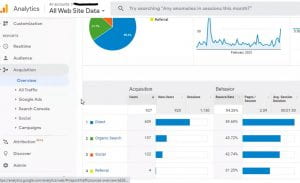 I’m Jeremy Bloom (a.k.a. the Internet Farmer). Being a software nerd of over 25 years, I’ve helped small-scale farmers and food business owners with their online needs. I have experience working on farms and creating some of the first co-op buying software out there. After teaching a class on E-commerce Best Practices for the recent Ag and Food Producers Academy I thought I would share some of the main takeaways. We’ve come a long way in recent years with E-commerce thanks to the pandemic, and in the local food scene it’s become a game changer. It’s been an interesting twist to the online sales world during this odd time in our history.
I’m Jeremy Bloom (a.k.a. the Internet Farmer). Being a software nerd of over 25 years, I’ve helped small-scale farmers and food business owners with their online needs. I have experience working on farms and creating some of the first co-op buying software out there. After teaching a class on E-commerce Best Practices for the recent Ag and Food Producers Academy I thought I would share some of the main takeaways. We’ve come a long way in recent years with E-commerce thanks to the pandemic, and in the local food scene it’s become a game changer. It’s been an interesting twist to the online sales world during this odd time in our history.
1. Cyber Security
This includes your domain name access, usernames/passwords and webmasters.
Control your domain name.
- Which means, have a username and password for access to your domain so you can make changes if need be. If you don’t have access, question who you are working with.
- Why do you need access? When your site goes down because your friend didn’t renew it and has left to sail the open sea, you’re not going to be happy when you’re offline until they get back.
Manage your usernames and passwords
- E-commerce connects to banks, emails, personal customer information, and is the lifeline to your sales.
- In many cases, you can set up a user name and password to give limited access to someone you’re working with. It can be a pain, but remember to change the password when the person is done working with you.
- Get a password manager like LastPass. This tool saves tons of time on so many levels of managing usernames and passwords.
Friends and family can be webmasters, but not professionally.
- Software is fun to tinker with and anyone can set up a domain and website that looks awesome on the surface. But are they thinking of your best interest for the long haul?
- Whether it’s your friend, a family member or a webmaster, do not let them set up a domain if you don’t get a username and password to it. You want to have direct control over the billing.
2. Analytics
E-commerce helps you see successes and can correct errors in your thinking.

Track past performance Read more E-Commerce Best Practices

